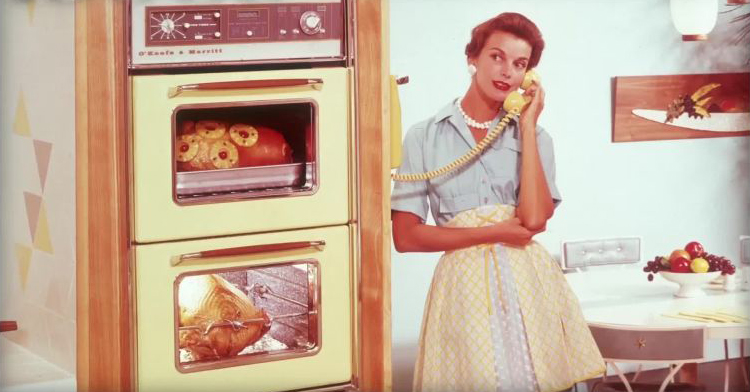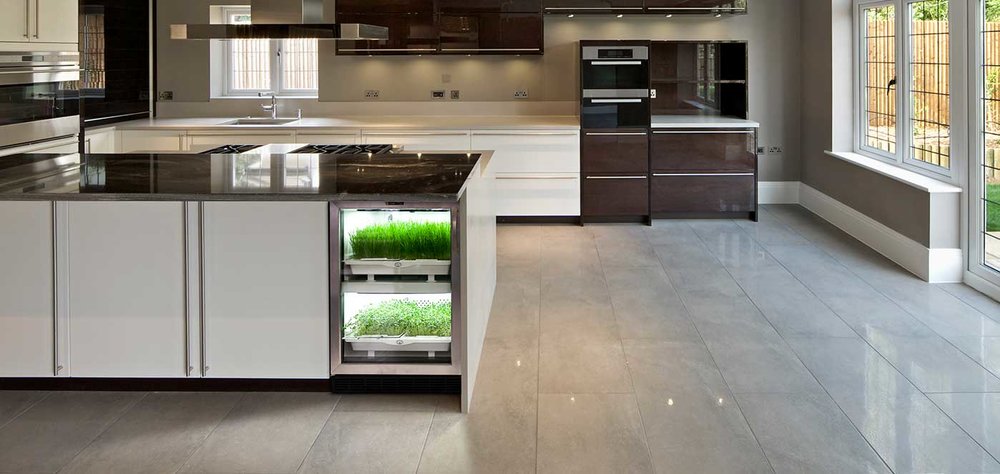The Future of 21st Century Kitchens
Kitchen design is continually changing. The changes in how we use our kitchens are driven by the way we live and move. In turn this changes the way we interact with our interior kitchen environment.
As interior designers, we are constantly thinking about how to improve the functionality of a home, especially in a central space such as the kitchen.
We are intentional about keeping tabs on the way lifestyles are influenced by changes including food culture, technology, and sustainability. With the rapid pace of change at the turn of the century, kitchens of the future aren't as far off as they sound.
Which of these future kitchen features would you implement into the kitchen of your future?
The Future Kitchen is a More Central Hub for Home.
It's hard to grasp that only a couple hundred years ago heating sources in the kitchen were limited to open fires and water was retrieved from springs and wells. Cooking indoors was a smoky, noisy, and smelly endeavor, leading them to be pushed away from the central space of the home to a more concealed area.
Advancements including ventilation, insulation, refrigeration and heating dramatically changed the architecture of kitchens, bringing them back to more central areas of the home.
At the turn of the century, it's no surprise that kitchens continue to be the focus of architectural evolution and are becoming even more central to the home than they already are.
"Today, it has been able to recover its role as central hub for meeting and inter-generational relationships in the home, due to aspects such as smaller home surface areas, women in the workforce, the need for work/life balance, new eating models and new technology and materials to equip the kitchen. This recovered relevance will require kitchen design to be taken much more into account — both aesthetically and functionally — in home construction and refurbishment projects."
Global Kitchen - The home kitchen in the Globalization Era, Cosentino 2017 Global Kitchen Report
Before we look forward, here's a quick look back on kitchens in the last 100 years. (Click to play slideshow.)

Architectural Digest - 100 Years of Kitchens
The Future of Cooking is Connected.
Smart home connectivity is not only the future; it is now. They tout features that save people time and money when cooking, meal planning, and grocery shopping.
A new crop of smart refrigerators can scan your grocery receipt to keep inventory on what you have in stock and notify you when something is low or near expiration. It will recommend recipes based on what you have and allow you to place grocery orders.
Smart ovens let you select a recipe, will remotely preheat your oven, and sync with your other smart appliances accordingly.
Smart kitchen appliances are connected to smart thermostats that detect when you are home or away. Compatibility between devices means you can lower the temperature in the kitchen area when the oven is on, or turn the oven off when your thermostat detects that you are out of the house.
The future of the connected kitchens are smart worktops. The goal is to have a mindful cooking experience through an interactive worktop. In the next 10-30 years, expect to see touchscreen stovetops and smart worktops hit the market. Smart worktops help cooks improvise based on cooking level, time preferences, and modifications.
IDEO and Ikea recently released Concept Kitchen 2025, not as a functional kitchen, but as a study of future behavior. The basic principle of the table is to bring inanimate objects to life using smart light, which uses a camera and projector above the table to mindfully interact with the user by projecting graphics onto the surface. The surface is capable of offering recipe suggestions, weighing food, facilitating improvisational cooking suggestions, and providing cooking recommendations based on skill level, time preferences and ingredient modifications.
The Future Kitchen Promotes Healthier Lifestyles.
I'm no scientific expert here, but, I do love to cook and I love using the best ingredients. Not everyone likes cooking, and not everyone cares about eating fresh whole foods. However, being of the health-conscious variety, let's imagine the future kitchen that caters to whole, healthy eating. The way we eat influences not just our physical health, but our emotional well-being too.
"We don't just eat to fuel our bodies—we eat for pleasure, communion, identity." Michael Pollan
Michael Pollan, author of Cooked, The Omnivore’s Dilemma, and In Defense of Food
The Future of Food: Experts Predict How Our Plates Will Change, Time.com 10/9/2014
We understanding and design kitchens as environments that fuel our physical, emotional, and social well-being.
More natural light in the kitchen or light systems that imitate natural light will be more prevalent in future kitchens. Future kitchens will be equipped to grow fresh, organic produce, herbs, and microgreens year-round without chemicals and with automatic watering cycles.

Urban Cultivator
The Future Kitchen is a Swiss Army Kitchen.
We think kitchens are for cooking and eating, maybe entertaining, but in reality, we do things in our kitchens that seem like activities for other rooms. My kitchen is host to homework, kids crafting, making phone calls, syncing calendars, sorting mail, I even hosted a floral design workshop around my kitchen island.
Future kitchens will offer more flexibility and fewer fixed elements such as countertops with adjustable heights that are more accessible and usable for people of all statures, ages, and abilities.
This year, the Silestone Institute brought together experts from all over the world to create a Global Kitchen report. Their findings on activities in the kitchen included the following results.
In a survey of 842 kitchen professionals across eight countries, 87% said that the kitchen would become more relevant as an activity and meeting place in the future, 81.5% think that it will incorporate dining/living room features, 92.3% agree that it will be used to get together with family.
Future kitchens will adapt better to this growing trend of being used as much more than cooking and eating areas.

The Silestone Institute, part of the Cosentino Group, illustration of Future Kitchen trends.
The Future Kitchens is a More Resourceful, Less Wasteful Kitchen.
Limiting waste may not be the first thing you think of when you imagine your future kitchen, but some are looking at the potential for kitchen waste to be conserved and converted into energy. The high goal is a net-zero energy kitchen.
Caesarstone in partnership with Pratt Institute invited Industrial Design students to create a vision of the kitchen of 2050 combining theory and practice. Their Future Kitchen is an experiment in bridging technology and nature to create a self-sustaining kitchen. Strategies include aquaponics, hydroponics, 3D printing, water filtration, indoor farming, composting and food storage.
Instead of traditional composting, organic waste like kitchen food scraps can be used to create biogas, a renewable energy source of gaseous fuel that results from the breakdown of organic matter. Biogas could fuel a kitchen’s cooking appliances. Also, to conserve water, this concept kitchen filters water for reuse to support hydroponic farming, growing plants without soil.

Caesarstone and Pratt Institute's Future Kitchen at NYCxDESIGN 2017
Central, smart, do-it-all, healthy, resourceful kitchens are the future. These evolutions in kitchen design are brought about by changes in social and emotional preferences, spatial demands, efficiencies improved through the development of technology, increased concern for well-being and health, and a growing awareness and concern about material life-cycle and energy use.
As our lifestyles continually morph to reflect changes in how we think and act, these studies, experiments and design solutions have us looking forward and ready to implement improvements in kitchens that cater to it's new demands and dreams.
Au revoir,
Jennifer Butler et cie
_________________________________________________________________________________________________
Need some help getting your interior design project going? Hiring a professional like the interior designers at Jennifer Butler Interior Design is a great place to start. We can help bring definition to your ideas for your home, office, business, new construction, renovation or remodel. This frees you to focus on your family, your work, your travel and recreation while our experts take care of the design and implementation. Rest assured that our designers will create interiors that realize your vision for spaces that meet your luxury lifestyle and 21st century work style needs and visually reflect your unique design style.
Sign up for more inspiration from our Designer Journal.
Schedule a 1-hr Introductory Consultation in our studio on us or
Schedule a 2-hr In-Home Design Consultation at our hourly rate
Contact us to get started.
